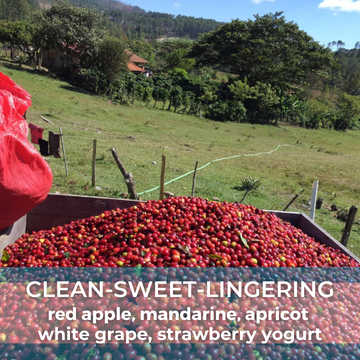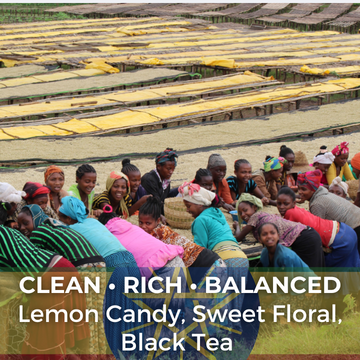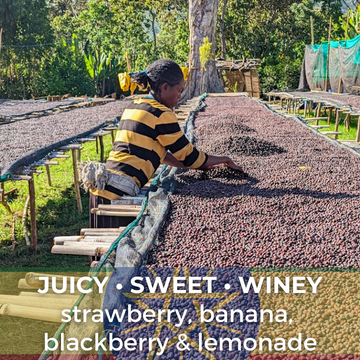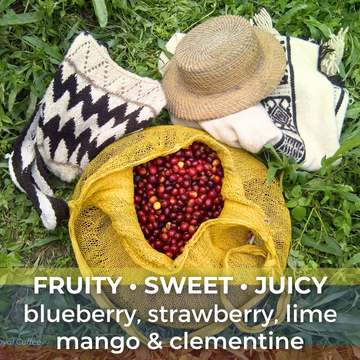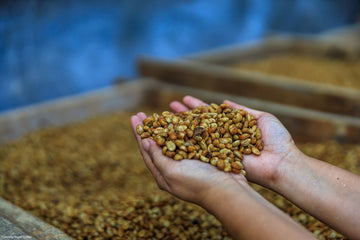Ethiopia Guji Allona Natural Organic
We haven’t purchased coffee from the storied Guji reason in a long while. That’s mostly because the coffees we’ve had available to us out of Oromia have been lower grade production offerings. But our patience has finally paid off! Here we have a bona fide single estate, grade 1 Guji that can compete with the best Yirgacheffe has to offer.
Speaking of, I think it’s safe to say this is a much more accessible coffee compared to its more popular counterpart. That means it’s still flavorful, juicy and sweet but there’s less intensity. It’s like you left the wine in the barrel an extra year. If you’ve avoided naturals because they’re too much for you, give this one a try. Yirgacheffes also tend to be fairly muted when it comes to acidity, but this coffee is surprisingly crisp and refreshing for a natural. With notes of peach, pear, honeysuckle and lemonade, it makes for the perfect flash iced coffee during these hot summer months.
Reminder! This coffee is raw, you must roast it before brewing
Arrival Date: June 13th, 2022. US Arrival: January 2022.
Acidity & Brightness: Fairly crisp and very sweet.
Balance & Finish: Slightly complex, lingering floral finish
Body & Texture: Medium to full bodied with a silky texture.
Flavors: Peach, pear, honeysuckle and lemonade
Grade: Grade 1, grown at 2000-2150 masl
Certifications: Organic
Processing: Natural (dry) processed and dried on raised beds
Grower: Allona Farm | Guji Highland Coffee Plantation
Region: Odo Shakiso District, Guji Zone, Oromia Region
Varietals: Indigenous cultivars 74110 and 74112
Recommended Roast Range: City to Full City (Light to medium)
Start at City (light) or just in to a rolling first crack and go a bit darker as desired. Natural processed coffee, particularly those from Ethiopia, tend to showcase best at lighter roasts. We find it best not to go any darker than Full City (Medium, after the end of first crack) and most folks will prefer a City + or at the tail end of first crack. Light roasts will have more sparkling acidity while medium roasts will accentuate more rounded sweetness and a touch more body.
Royal Coffee - " There are few entrances to Guji--a distant and heavily forested swath of land stretching southeast through the lower corner of the massive Oromia region--and none of these routes are short, or for the queasy, in any way. Guji is heavy with primary forest thanks to the Guji tribe, a part of Ethiopia’s vast and diverse Oromo nation, who have for generations organized and legislated to reduce mining and logging outfits in their area, in a struggle to conserve the land’s sacred canopy. Compared to other coffee-heavy regions, large parts of Guji feel like prehistoric backwoods. Coffee farms in many parts of Guji begin at 2000 meters in elevation and tend to climb from there. The highland farming communities in this part of the country can be at turns Edenic in their natural purity, and startlingly remote. In Guji’s central Odo Shakiso district is the Allona Farm, owned and operated by Guji Highland Coffee Plantation (GHCP), one of the region’s newer and more ambitious coffee producing businesses. GHCP was founded in 2012 by Ato Wodessa Yachisi, and then re-organized into a larger corporate entity in 2015 so as to include the processing of regional smallholder coffee and exportation. The farm itself is 200 hectares and produces exclusively coffee, employing more than 2000 workers during harvest months of October – December. Allona has its own washing station as well as 4 wet and natural processing units throughout its property, all of which are used for estate-grown coffee and the coffee produced by regional smallholders, or “outgrowers”, whose combined farm land equals more than 1100 hectares of additional production coming to GHCP and whose techniques are carefully guided by GCHP’s extensive knowledge. GHCP is directly involved in community support, using their large footprint in central Guji to impact local infrastructure. At their processing stations in Dukem and Gelan they have installed water filtration systems to provide drinking water to 100 local families, as well as processing employees and their families; in Shakiso where Allona Farm is located GHCP has designed and built over 15km of roads connecting marketplaces to residential communities to schools, another area of investment in which they are regularly financing the re-building or expansion of local Shakiso schools.”
